Ordinary hero: Don Chandler’s epic ride from Brisbane to Longreach
Unfit, with no bike and no cycling experience, Don Chandler signed up for a 1200km ride to the outback. Nobody thought this would end well...
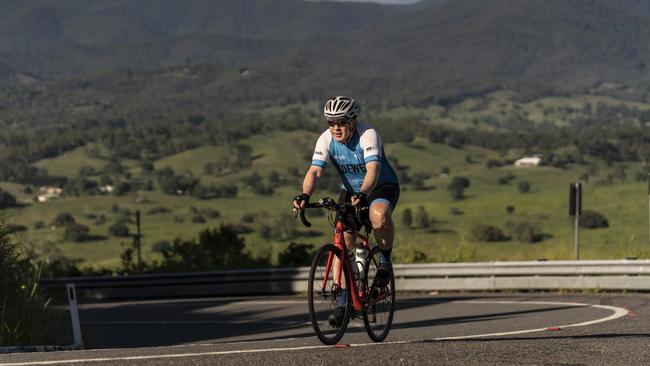
This is an end of the rainbow story. Bloke bravely travels across places unknown to find his pot of gold. We all have our personal rainbows. Some folks reach the end of them and some folks don’t even know where their rainbows begin. Some rainbows are made of money, some are made of mountains. Don Chandler’s was made of bitumen and dirt.
Don was born 54 years ago in the Barcaldine Hospital, 105km east of Longreach, 890km west of Brisbane. He was flown home from hospital in the arms of his mother, Jenny, inside the 1963 Piper Cherokee four-seat light aeroplane his father, Ranald, flew regularly to and from the family’s cattle and sheep property outside Barcaldine. Don was the youngest of four boys and some years after his birth his mother informed him, with the kind of straight-up, no bulldust honesty one should expect anywhere west of Augathella that the only real reason he was alive was because he was supposed to be a girl.
His friends call him Donny. He’s a respected and diligent investment adviser for Crestone Wealth Management. He’s not famous for anything but he’s renowned among his friends. “Donny’s always there for you,” they say. “Donny wouldn’t say a bad word about anyone,” they say. He lives on acreage in Brookfield, west of Brisbane, and the many things he’s done for the local community as chairman of the Brookfield Recreation Reserve Trust have been done without fanfare and fuss.
Like his father before him he’s a father of four: Angus, Jessie, Lachie and Georgina. He enjoys a beer but he knows when to pull up if he’s going to drive his girls to rowing at sunrise. He tells people he loves fishing and he loves camping with his mobile phone switched off on the northern tip of Fraser Island but everybody knows what he loves most in this world is being beside his wife, Alison. Beside her in the car. Beside her by a football field. Beside her when he turns out the light. Just being beside her. That’s enough. He met her in high school. They married in their mid-20s and they built a simple and wondrous world together and every single day Don Chandler is grateful that Jenny Chandler’s fourth child was not a girl.
This is not a dramatic story. Maybe there’s more than enough drama right now in our daily lives where handshakes are hazardous and grocery shopping feels like an extreme sport. This is not a story filled with thrills and twists and nail-biting suspense. This is just the story of something Don Chandler from Brookfield did in 2018 that made many people smile, most importantly himself. This is the story of a ride Don took on his bicycle and a ride he will soon take again. This is the story of Don’s personal rainbow that stretched 1200km across the state of Queensland and ended in the arms of his wife.
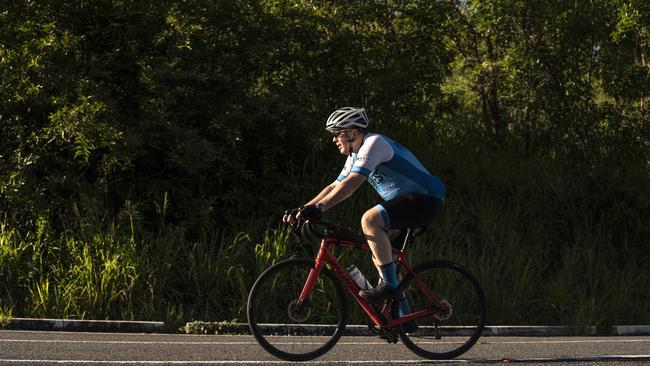
It began at his office desk in the heart of the Brisbane CBD on November 30, 2017. He was staring at his computer with his cursor hovering over the “send” button on an email he couldn’t believe he was foolish enough to write. “November 30 was D-Day,” Don says. “I honestly sat at my desk for an hour going, ‘Should I do this?’”
He took a deep breath, shook his head and clicked “send” on the email informing his friends and family that he was joining a 31-person peloton on the seven-day RideWest charity bike ride stretching 1237km from Brisbane to the iconic cattle and sheep town of Longreach, central west Queensland. That’s roughly 250km longer than riding from the bottom of France to the top. Only 150km shorter than traversing the whole length of the island of Great Britain between its southwestern and northeastern extremities.
“This is way outside my comfort zone,” Don announced to friends and family. “My dear Mum said I was a ‘silly old fool’. I suspect she may be right!”
The RideWest charity bike ride has occurred every two years since 2010, when a Queensland businessman and keen cyclist named Les Hancock, shocked to learn that the suicide rate of remote outback Queensland graziers was 30 per cent higher than that of their coastal counterparts, rallied a small group of riders and set out for Longreach in the name of raising awareness and much-needed funds for outback mental health. To be eligible to participate, riders are expected to raise a minimum of $5000, undertake a rigorous health and fitness check and submit themselves to the heart-breaking, mind-bending, leg-locking pain that comes with training to ride for seven consecutive days across 1200km. In October, all being well, RideWest will pedal out on its 10th anniversary ride having raised more than $1 million for the Royal Flying Doctor Service to deliver mental health services through their Wellbeing Out West program.
“I honestly didn’t think I could do it,” Don says. “I hadn’t ridden a bike since high school.” He would be the first to tell you that age played a part in this but age wasn’t the whole of it. “I didn’t want to get to 65 and say I didn’t do this thing 10 years ago,” he says. “I wanted to be able to look back and say I did do it. But I just didn’t think I was physically capable of doing it.”
“Forty is the old age of youth,” said Victor Hugo. “Fifty is the youth of old age.” When he first signed up for RideWest, Don was smack-bang in the age bracket of 45-54, which the Australian Bureau of Statistics singles out as the least satisfied generation in Australia. That’s all of us Generation Xers out there climbing steep bushland hills on epic pre-dawn endurance rides on Saturday mornings. All those people who swapped their Dr Martens boots for gel-cushioned runners and sleeveless tops that say, “I completed the Tough Mudder endurance obstacle run and only lost one lung!” and “I climbed to Everest Base Camp and only lost three toes!” What the hell are we all trying to find at the end of these personal rainbows? The truth lies somewhere between a better tasting beer and complete existential illumination. But Don Chandler’s reasons ran deeper than age brackets and he had to ride into the west to find those reasons for himself.
“To be honest, I was concerned about Donny participating,” says Rob Sendall, a Brisbane accountant who plans to complete his third RideWest as the 2020 ride captain, the man tasked with assessing the physical and mental health of riders along the journey. “I was worried he wouldn’t physically be able to complete it. He was unfit. He had zero riding experience. When I did my first RideWest in 2016 it was shocking to me how hard it was. And fitness-wise, I was probably OK. It’s the mental side. Yeah, you get the sore backside because you’re spending so long on the seat and the muscles hurt like hell but it’s the mental side of this thing that gets you. You can actually lose your thoughts. You lose your head because it’s all so monotonous after that amount of time. We had a guy in 2016 on the last day, which is a 216km slog; he’s just gone into this mental blackout zone, and he’s taken off ahead of the peloton and we’re yelling out at him and he’s 30m ahead and can’t hear us because he’d completely lost himself. That’s what it does to you. It messes with your head. Safety is the primary concern. Physical and mental fatigue can bring about disasters. I was genuinely concerned for Donny.”
A comfortable body weight for a RideWest journey would be 70-80kg. Don was nudging 110kg when he signed up. RideWest director John Sloman allowed Don to take his heart and fitness test after a few months of training as opposed to testing at sign-on like the other riders. “He wouldn’t have passed the test otherwise,” Sloman says.
“Carrying that kind of weight in an endurance race starts to feel like there’s two of us on the bike,” says rider Toby Winten, a self-managed super fund adviser and one of the bigger men in the peloton. “Two blokes riding but only one of them is pedalling. The hardest part is not wanting to let anyone down. The peloton is as fast as its slowest rider. A slow rider can make a ride take twice as long.”
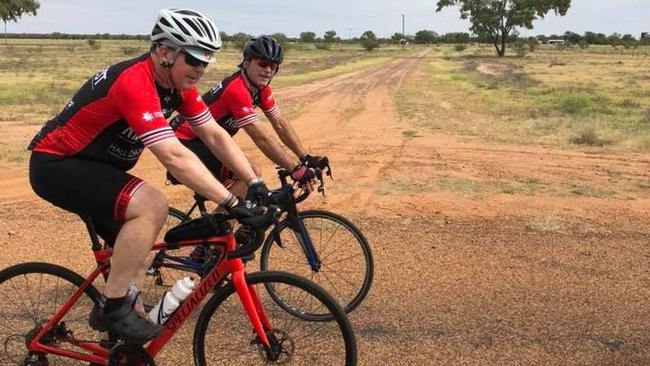
Don didn’t even own a bike. When he finally purchased his wheels – a Specialized road bike – in January 2018, he had less than three months to train and prep for the epic ride. “A ridiculously brief prep time,” says Sendall. Don knew nothing about what skins to wear for training, what shoes to wear. “I fell off my new bike on my first ride,” he says. “I went down the hill from my home in Brookfield, down by the creek, and I dropped my water bottle and I tried to stop and lean down to grab it but I was all clipped in to the pedals and I couldn’t get out and I just fell straight on my arse. Honestly, I did not have a clue.”
The first training ride saw group leaders Sendall and Sloman send Don straight up the 287m high Mount Coot-tha in Brisbane’s inner west. “It was only his own ignorance that saved him,” Sendall says. “I come up behind Donny and he’s powering up that long hill and I said, ‘Mate, you’re in the wrong f..kin’ gear. That lever on the right hand side, push it across three times’.”
But something kept Don turning up to training. Wednesdays and Saturdays before dawn for almost three months. And slowly he learnt how to retrieve and secure his water bottle while moving at 30km/h. “Next they were on to me about learning how to eat a peanut butter sandwich while riding,” Don says. “I’m flat out staying on the bloody thing, let alone having a snack.”
Training rides increased in distance and each ride was a personal best for Don. Fifty kilometres. Eighty kilometres. One hundred and thirty kilometres. The hills got higher and his weight got lower.
“Don’s the miracle man,” says long-time friend and 2020 RideWest participant Greg Kelly. “By the time I start this year’s ride I’ll have been at it for 18 months, training and training. This bloke had three months’ prep before he rode out. That’s insane. I don’t know how he even started it.” He taps his temple. “But Donny’s got the stuff up here. The mental stuff. Something was pushing him on.”
Who’s to say where inspiration comes from. Maybe it comes from the stars or the waves on a beach or a rousing speech from a total stranger. Maybe it comes from a simple and undramatic magazine story about some ordinary father of four who attempted something ridiculous; something so far out of his comfort zone that his wife worried he might have a heart attack in the process of achieving it. Don Chandler’s inspiration to keep going during the seven days of RideWest came from many unexpected places. The first place it came from was grief.
“I’d lost my niece about four months earlier,” he says. Her name was Pru Chandler and she was the keeper of a kind and huge heart and her life was cut short at 30 after living for 15 years with anxiety and mental health issues. “A really, really great kid,” he says. “She got anorexia when she was around 15, just as she was really blossoming. That really affected the next 10 years of her life. It went from that to depression and anxiety and she just battled and battled. She got out of hospital as a 30-year-old after having treatment for her issues and then she died in her mum and dad’s home. My brother and his wife. It was a Saturday morning. She’d had a pulmonary embolism. It was just one of those dreadful days for any family. I’d been at rowing with my daughter and just got the phone call as we were leaving. I was towing the bloody boat trailer.”
And he pauses for a long moment when he reflects on this. “The minute I think about Pru on a ride… I don’t know… she motivates me.”
He can’t explain that phenomenon; how a man can take inspiration from sadness; from the loss of someone he loved deeply. “She was my brother’s daughter but she was helping me,” he says. “And I worried that that was overstepping the mark, putting that on my ride like that, but her mum and dad really appreciated it. It brings back her memory. I’m remembering her when I ride.”
He wanted to give the ride everything, the same way Pru gave everything to the ones she loved. “When she died I said, ‘I’m gonna do this ride and I’m going to dedicate it to her’. That was, in truth, the biggest motivation. It was in the back of my mind the whole time. I couldn’t pull out of this thing. No matter what. That’s the truth.”
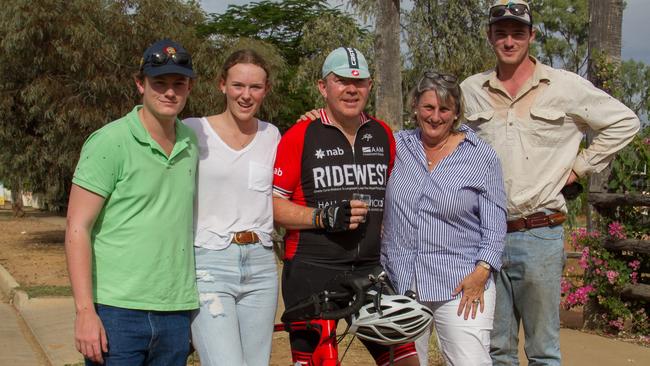
Day One was murder, start to finish. A frantic and taxing police escort push out of Amberley Air Base, on the western fringe of Brisbane. Ride captain Rob Sendall was looking up and down the inside channel of the peloton. A two-by-two formation of 31 riders. When a peloton is working as a team in perfect rhythm, a gun-barrel-straight line of space can be traced from the front of the peloton to the back. “When you get that line it means everybody is riding with efficiency and you’re getting the best from the [aerodynamic] draft,” Sendall says. What he saw down that central channel on Day One was a mess of elbows and knees and dangerously shaky front wheels, a peloton with all the grace and cohesion of an Ibiza conga line on New Year’s Eve. Then came the single toughest climb of the entire journey: tackling the punishing Toowoomba Range via Murphy’s Creek Road. Five kilometres of hellish undulation just to get to an ascent so sharp it looks to the weary rider like the land itself is performing a magic trick before your doubting eyes, like the road is rising out of the earth and is in the process of folding over itself like an ocean wave the size of Uluru. “Two and half kilometres up a 20 per cent gradient,” John Sloman says. Professional endurance riders have been known to hop off their bikes and walk up brief gradients of 27 per cent.
“There’s a big red sign that says, ‘Steep climb’, just to remind you of how painful this thing is about to be,” says Sendall. Adds Don: “You’re climbing and climbing and then you hit what feels like a wall of a hill. It just goes up. And you’ve already ridden 100km to get to that point.”
The peloton broke up. More experienced riders powered straight up the range while Don and the other first-timers began zigzagging up the climb slowly, metre by metre, inch by agonising inch. And every rider knew in that moment who their enemies were on this wild quest. The endless and unforgiving road west. The Queensland sun and the heat it brings in the middle of the day, even in autumn. The friction rashes that build up in your crotch and between the cheeks of your arse. The whispering devil on every rider’s shoulder. Just hop off the bike. You’re too old for this shit. Just hop off the bike. You never should have signed up for this in the first place. You’re not Iron Man. You’re Numbers Guy. You never should have stepped out of that airconditioned office. Who are you kidding? Foolish man in your mid-50s. Just hop off the bike.
Riders who were still breathing reached the top of the climb only to realise they had another hour’s ride to reach their first-night stopping point in the town of Oakey. “On any day, that last 20km is the most dangerous,” Sendall says. “People are very tired and they’re starting to relax because they’re close to stopping. It’s a pack of 30 riders sitting on 30km/h. Something as simple as someone riding a bit too close. Wheels connect. One person goes down. Then everybody goes down. It happens with the pros and it can sure as hell happen with us.”
That night after an ice bath and several chicken sandwiches served by the Oakey CWA, Don phoned Alison back in Brisbane. “I’m alive,” he said, genuinely unsure how long he expected to stay that way. But fear of the days ahead didn’t dampen his spirits during that phone call. Don and Alison learnt long ago to appreciate each day as it comes. Just being alive is always enough.
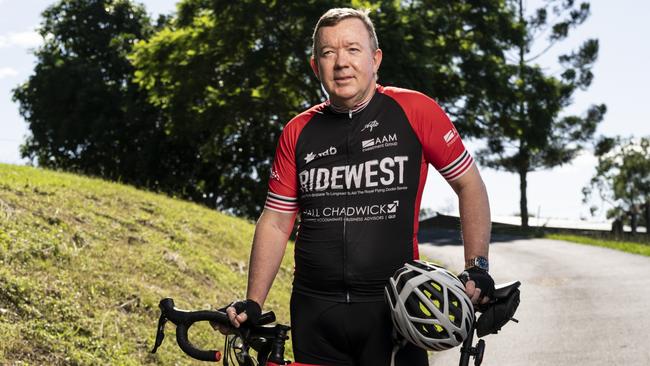
Days Two and Three were murder, start to finish. Oakey to Chinchilla, 174km. Chinchilla to Roma, 219km. Bones locked up with pain. Muscles seizing up. Bodies stinking of sweat. Pressure sores. Backsides dripping with chamois cream to ease the friction. “I reckon that Roma day is the hardest day,” Sloman says. “I’ve done that ride three times and the first time I did it I got off my bike in Roma and my whole body was shaking. I was cooked. It’s the first time you’ve ridden three consecutive days.”
Don rode towards Roma, 479km from Brisbane, thinking about his wife. “She’s a Roma girl,” he says. He was thinking about Alison and her own personal rainbow. All that was waiting at the end of her rainbow was time on earth. More days to spend with Don and their four kids.
“In 2007, Alison was diagnosed with breast cancer,” Don says. “That was a very scary time for all of us, Alison most of all. Our youngest, Georgie, was in Year One at the time. And the cancer was fairly nasty, let me tell you. But Alison got through it. She’s gone 13 years now and soldiering on.
“You definitely think about these things when you’re riding. Just everything she got through. Then you start talking to other riders about the things their families got through and it gets you bloody emotional. And these things put a lump in your throat out there and they keep you pushing on. Somehow they inspire you.”
He needed that inspiration on Day Four. Roma to Mitchell was only 87km but Don was spent. “Really struggling on that day,” he says. “I thought it was gonna be a breeze but I was a mess. I just felt half-cooked. How could the shortest ride be one of my hardest?” He was close to bonking that day. That’s cycling talk for the shakes and the sweats and the feeling of hitting your figurative wall. Dizzy spells and light-headedness. Total weakness in the body. Bonking can get to the brain as well, make a rider anxious and irritable, confused and emotional. Bonking is bad news. If that ride to Mitchell went any longer Don may have gone the bonk. But then came Days Five and Six. That enemy road that never stopped winding. Mitchell to Augathella, 189km. Augathella to Blackall, 219km.
“Flat-out fatigue,” Don says. But fatigue has an unlikely cure on the road. “Mateship,” he says. The way a seasoned rider drops back and gives you a pat on the back in your darkest hour at the tail end of the peloton when you think for all money you’re sliding away from the pack. A few key words of encouragement from some bloke who’s also struggling and these words can balance out the whispers from the devil. Look how far you’ve come, Don. You’re almost there, mate. If you stay alive long enough you might just make it to Longreach. All the way to the finish line, Don. All the way to the end of the rainbow.
One rider, John Storie, was unknowingly riding with two broken ribs from a fall but he vowed to keep going because he wanted to make it to his old home town, Tambo, 100km from Blackall. “That was personal for me,” Storie says. “I lived in Tambo during the 1980s when the wool prices were right down and people would go out and shoot 10,000 sheep, one by one. Some blokes got to the point where they’d say, ‘Well, why don’t I just add one more bullet and take my own life?’ And that was always happening at that time and we didn’t know about it. It all happened so quietly. This ride is the complete reverse of that. We’re all talking about it.”
Every RideWest rider can talk about it. “I had a grazier client of mine who took his life,” says accountant Greg Kelly. “I found that un-believable. He was a methodical guy. Everything was in order. What led him to the point where he walked out into a paddock with a gun? That’s hard to reconcile. Where was he at in that moment?”
“About a year before the 2018 ride I reconnected with a bloke from Barcaldine that I’d travelled through the United States with 30 years ago,” Don says. “We catch up again and we have the loveliest chat. His wife was wonderful and he had a daughter in Brisbane doing law and just before the ride started, when we were still training, he watched his son play footy in town and then he drove out to their little block and took his life.”
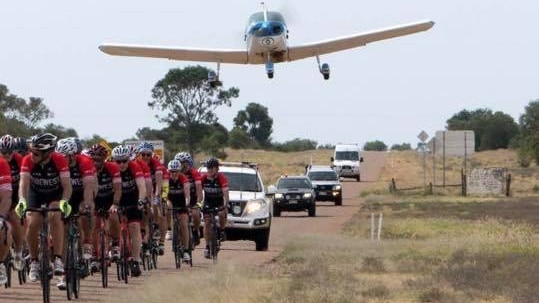
Don Chandler raised $29,222.56 for outback mental health services through donations from family and friends who sponsored his epic ride to Longreach in 2018. Today, he’s training twice a week in preparation for RideWest 2020 in October. He will ride it alongside his eldest son, Angus.
He’s warned Angus about everything he will face along the way. The doubts, the fears and the days where he’ll be certain he’s going to vomit over the handlebars. But he’s told Angus about that last day of the ride, too. That sublime last day. That perfect day. That day of illumination. Blackall to Longreach, 216km. He told Angus about how good it feels to smell the gidgee trees on the long ride towards Barcaldine. Those gidgee trees meant home to Don and home meant his mum and dad and his three older brothers. But make no mistake, he was spent. His body was broken even if his heart was full.
Then, in his darkest physical hour that day, came a flash of light from the skies. A soaring gift just for Donny Chandler. A small aeroplane flying above the peloton, urging the pack onward. Bringing the pack home. A 1963 Piper Cherokee, the very plane that brought baby Don home from hospital all those years ago. And he couldn’t tell if it was sweat or tears in his eyes when he looked up at that plane to find Angus waving at him through a passenger window. And let it be recorded in that thick book someone will one day title The Greatest Ever Moments in Western Queensland Endurance Cycling that at that very moment, ride captain Rob Sendall looked back down the central channel of his 31-person peloton and saw a gun-barrel straight line of space. “A clear line right down the middle,” Sendall says. “A perfect, clear line. And all I saw were cyclists. Proper cyclists. A team of seasoned professionals.”
Time slowed as the peloton rode into Longreach. “Life kind of crystallised in that moment,” Don says. His brother, Peter, and his sister-in-law Barb – Pru’s parents – were waiting for him at the figurative finish line. Don gave Barb a long hug. “That was for Pru,” he said.
And then he went to the place where he’s happiest. He went to stand beside his wife who’d flown in to meet him at the end of the rainbow. He was covered in sweat and dust and chamois cream but he hugged Alison like he’d never hugged her before. Because he found his pot of gold and it was everything he had before he started. Donny Chandler was half-dead but he’d never felt so alive.
For more information: ridewest.com.au; for crisis support, call Lifeline on 13 11 14 or visit lifeline.org.au.


To join the conversation, please log in. Don't have an account? Register
Join the conversation, you are commenting as Logout